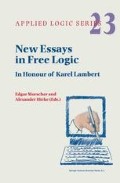Abstract
The field of modal logic spans a very wide range of philosophical notions and motivations, with the result that to construct any particular formal system will require that a number of choices be made between alternative intuitions and goals. This is particularly true of quantified modal logic, since here disparate modal notions combine with alternative interpretations of quantification to produce a labyrinth of technical possibilities. Unfortunately, even though the number of possibilities is large, the theoretical ingredients seem to interact in ways which force internal compromises. For example, choices in favor of standard first-order logic conflict with modal intuitions about assertions involving possible objects, while the “primary” reading of necessity as logical validity runs up against the problem of not being recursively axiomatizable.
Access this chapter
Tax calculation will be finalised at checkout
Purchases are for personal use only
Preview
Unable to display preview. Download preview PDF.
References
Bencivenga, Ermanno (1986): “Free Logics”, in Dov M. Gabbay, Franz Guenthner, eds., Handbook of Philosophical Logic, vol. 3, Dordrecht: Reidel, 373–426.
Boolos, George (1979): The Unprovability of Consistency, Cambridge: Cambridge University Press.
Carnap, Rudolf (1937): The Logical Syntax of Language, London: Routledge & Kegan Paul.
des Rivières, Jim/Levesque, Hector J. (1986): “The Consistency of Syntactical Treatments of Knowledge”, in Joseph Y. Halpern, ed., Theoretical Aspects of Reasoning about Knowledge. Proceedings of the 1986 Conference,Los Altos/CA: Morgan Kaufmann, 115–130.
Garson, James W. (1984): “Quantification in Modal Logic”, in Dov M. Gabbay, Franz Guenthner, eds., Handbook of Philosophical Logic, vol. 2, Dordrecht: Reidel, 249–308.
Gupta, Anil (1982): “Truth and Paradox”, in Journal of Philosophical Logic 11, 1–60.
Kleene, Stephen C. (1952): Introduction to Metamathematics, Amsterdam: North-Holland.
Kripke, Saul A. (1963): “Semantical Considerations on Modal Logic”, in Acta Philosophica Fennica 16, 83–94.
Kripke, Saul A. (1975): “Outline of a Theory of Truth”, in The Journal of Philosophy 72, 690–716.
Lambert, Karel, ed. (1970): Philosophical Problems in Logic. Some Recent Developments, Dordrecht: Reidel.
Lambert, Karel (1981): “On the Philosophical Foundations of Free Logic”, in Inquiry 24, 147–203.
Leblanc, Hugues/Thomason, Richmond H. (1968): “Completeness Theorems for some Presupposition-Free Logics”, in Fundamenta Mathematicae 62, 125–164.
Martin, Robert L./ Woodruff, Peter W. (1975): “On Representing `True-in L’ in L”, in Philosophia 5, 213–217.
Mates, Benson (1965): Elementary Logic,Oxford: Oxford University Press. Montague, Richard (1963): “Syntactical Treatments of Modality, with Corollaries on
Reflection Principles and Finite Axiomatizability”, in Acta Philosophica Fennica 16, 153–167.
Quine, Willard Van Orman (1953): “Three Grades of Modal Involvement”, in Proceedings of the Xlth International Congress of Philosophy, vol. 14, Amsterdam: North-Holland, 65–81.
Schweizer, Paul (1987): “Necessity Viewed as a Semantical Predicate”, in Philosophical Studies 52, 33–47.
Schweizer, Paul (1992): “A Syntactical Approach to Modality”, in Journal of Philosophical Logic 21, 1–31.
Schweizer, Paul (1993): “Quantified Quinean S5”, in Journal of Philosophical Logic 22, 589–605.
Skyrms, Brian (1978): “An Immaculate Conception of Modality”, in The Journal of Philosophy 75, 77-–96.
Skyrms, Brian (1981): “Mates Quantification and Intensional Logic”, in Australasian Journal of Philosophy 59, 177–178.
Smorynski, Craig (1985): Self-Reference and Modal Logic, Vienna-London-New York: Springer.
Thomason, Richmond H. (1970): “Some Completeness Results for Modal Predicate Calculi”, in Lambert ( 1970 ), 56–76.
Author information
Authors and Affiliations
Editor information
Editors and Affiliations
Rights and permissions
Copyright information
© 2001 Springer Science+Business Media Dordrecht
About this chapter
Cite this chapter
Schweizer, P. (2001). Free Logic and Quantification in Syntactic Modal Contexts. In: Morscher, E., Hieke, A. (eds) New Essays in Free Logic. Applied Logic Series, vol 23. Springer, Dordrecht. https://doi.org/10.1007/978-94-015-9761-6_4
Download citation
DOI: https://doi.org/10.1007/978-94-015-9761-6_4
Publisher Name: Springer, Dordrecht
Print ISBN: 978-90-481-5915-4
Online ISBN: 978-94-015-9761-6
eBook Packages: Springer Book Archive

